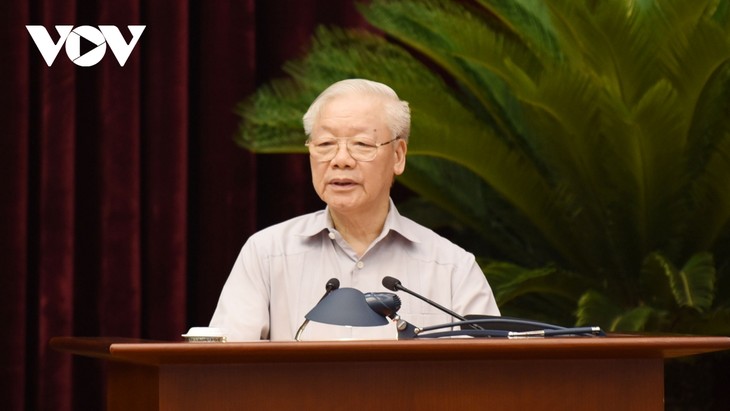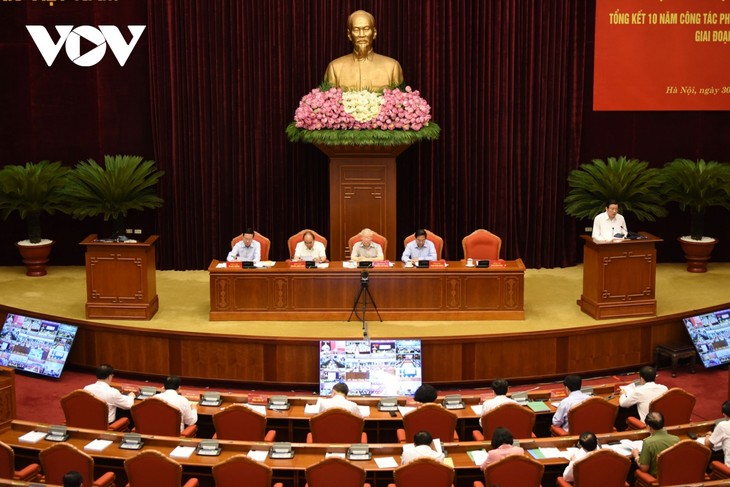(VOVWORLD) - Since 2012 Vietnam has made strong breakthroughs and recorded important and comprehensive results in corruption prevention and control, which contribute significantly to protecting the ideological foundation of the Communist Party and socialism. This assessment was heard at the national conference reviewing 10 years of corruption prevention and control in Hanoi on Thursday. A strict prevention mechanism is the prime factor determining the success of Vietnam's anti-corruption work.
 Party leader Nguyen Phu Trong, head of the National Steering Committee for Corruption Prevention and Control, addresses the national conference to review 10 years of corruption prevention and control 2012 – 2022 on June 30, 2022 in Hanoi. (photo: VOV) Party leader Nguyen Phu Trong, head of the National Steering Committee for Corruption Prevention and Control, addresses the national conference to review 10 years of corruption prevention and control 2012 – 2022 on June 30, 2022 in Hanoi. (photo: VOV) |
In May 2012, the Party Central Committee decided to establish the National Steering Committee for Corruption Prevention and Control affiliated to the Politburo and led by the Party General Secretary to comprehensively manage anti-corruption work nationwide. Since its establishment in February, 2013, Vietnam’s anti-corruption work has spread a positive influence in society, been widely supported by the people, cadres, and Party members and acknowledged by the international community.
Vietnam has fine-tuned its anti-corruption mechanisms. The inspection and supervision work of the Party and the investigation and audit work of the State have been strengthened to detect and handle violations and tighten discipline.
Party Committees and Inspection Committees at all levels have disciplined more than 2,700 Party organizations and 168,000 Party members, including 7,390 Party members disciplined for corruption.
The Party Central Committee, the Politburo, the Secretariat, and the Central Inspection Commission have disciplined 170 senior cadres, including 33 members and former members of the Party Central Committee and 50 general-level officers of the armed forces.
 The national conference to review 10 years of corruption prevention and control 2012 – 2022 on June 30, 2022 in Hanoi. (photo: VOV) The national conference to review 10 years of corruption prevention and control 2012 – 2022 on June 30, 2022 in Hanoi. (photo: VOV) |
Since the beginning of the 13th Nation Party Congress from January last year, 50 cadres managed by the Party Central Committee have been dealt with, including 8 members and former members of the Party Central Committee, and 20 general-level officers of the armed forces.
Inspection and audit work has dealt with 44,700 collectives and individuals for committed violations, collected over 42 billion USD in fines as well as approximately 76,000 hectares of land, transferred to investigating agencies 1,200 cases of suspected crime, and revised more than 2,000 legal documents.
Investigation, prosecution, and adjudication work has strictly abided by the spirit of "no forbidden zones, no exceptions, no matter who that person is," which has created breakthroughs in anti-corruption work.
Over the last decade, legal proceedings agencies nationwide have investigated 19,540 cases involving 33,860 individuals, and prosecuted 16,700 cases involving more than 33,000 individuals.
Since the beginning of the 13th National Party Congress, 4,200 cases involving 7,570 individuals have been investigated or prosecuted for corruption, abuse of authority, or financial violations. The National Steering Committee has put 977 serious and complicated corruption cases on the concern list. Of these the National Steering Committee has directly monitored 133 cases involving 180 crimes. Authorities have completed the investigation and prosecution of 120 cases involving more than 1,080 defendants, including 37 defendants who were former officials under the management of the Party Central Committee.
Recently functional agencies have investigated and handled several especially serious corruption cases which caused huge losses in the medical sector or associated with land use, the stock market, or business bonds.
Mechanisms have been reinforced and fine-tuned to prevent corruption. The Party Central Committee, the Politburo, and the Secretariat have issued more than 250 documents on Party building, political system building, and anti-corruption. The National Assembly has amended, supplemented, and promulgated more than 300 new laws, ordinances, and resolutions. The Government and the Prime Minister have issued more than 2,000 decrees and decisions. Ministries, sectors, and localities have issued thousands of legal documents to institutionalize and implement the Party's guidelines and policies on socio-economic management and corruption prevention and control.
Personnel work has been reformed to increase democracy and transparency. Problems in personnel work have been reduced. Lobbying for position and power has been discouraged. Other measures include controlling assets, income, and non-cash payments; promoting administrative reform; enhancing transparency and accountability; and improving the investment and business environment to discourage corruption and negativity.
Over the last decade the National Steering Committee for Corruption Prevention and Control has reformed itself to improve efficiency. Last September, the Politburo issued Decision 32 to supplement and extend the functions, tasks, and authority of the National Steering Committee to direct both anti-corruption and negativity. Home affairs agencies and Party inspection, investigation, prosecution, trial, and punishment agencies have been consolidated to closely coordinate with each other. 34 provinces and cities have now established Provincial Steering Committees for Anti-corruption and Negativity in order to make stronger changes in anti-corruption and negativity at the grassroots level.
Vietnam’s anti-corruption achievements have been supported by the people, which reflects the public’s confidence in the Party and confirms the correctness and appropriateness of the Party’s anti-corruption goals, viewpoints, policies, and solutions.